Dementia Care Synopsis: Aged Care, Nursing, and Future Implications
VerifiedAdded on 2020/03/04
|7
|2937
|60
Report
AI Summary
This dementia care synopsis provides a comprehensive overview of dementia, its various forms, and the challenges it presents, particularly among the elderly. It emphasizes the crucial role of aged care nursing in providing person-centered care, addressing physical and emotional well-being, and offering family support. The report highlights the importance of early education, management of accompanying symptoms, and the adoption of cognitive and behavioral interventions. It also addresses the implications of dementia knowledge for aged care practice, emphasizing the need for nurses to support patients, families, and caregivers, and to connect them with community resources. Furthermore, the synopsis identifies gaps in knowledge and the need for improved care delivery models, such as the chronic care model, to enhance patient outcomes. It concludes by stressing the significance of nursing practice in promoting health, active aging, and providing compassionate care for individuals with dementia.
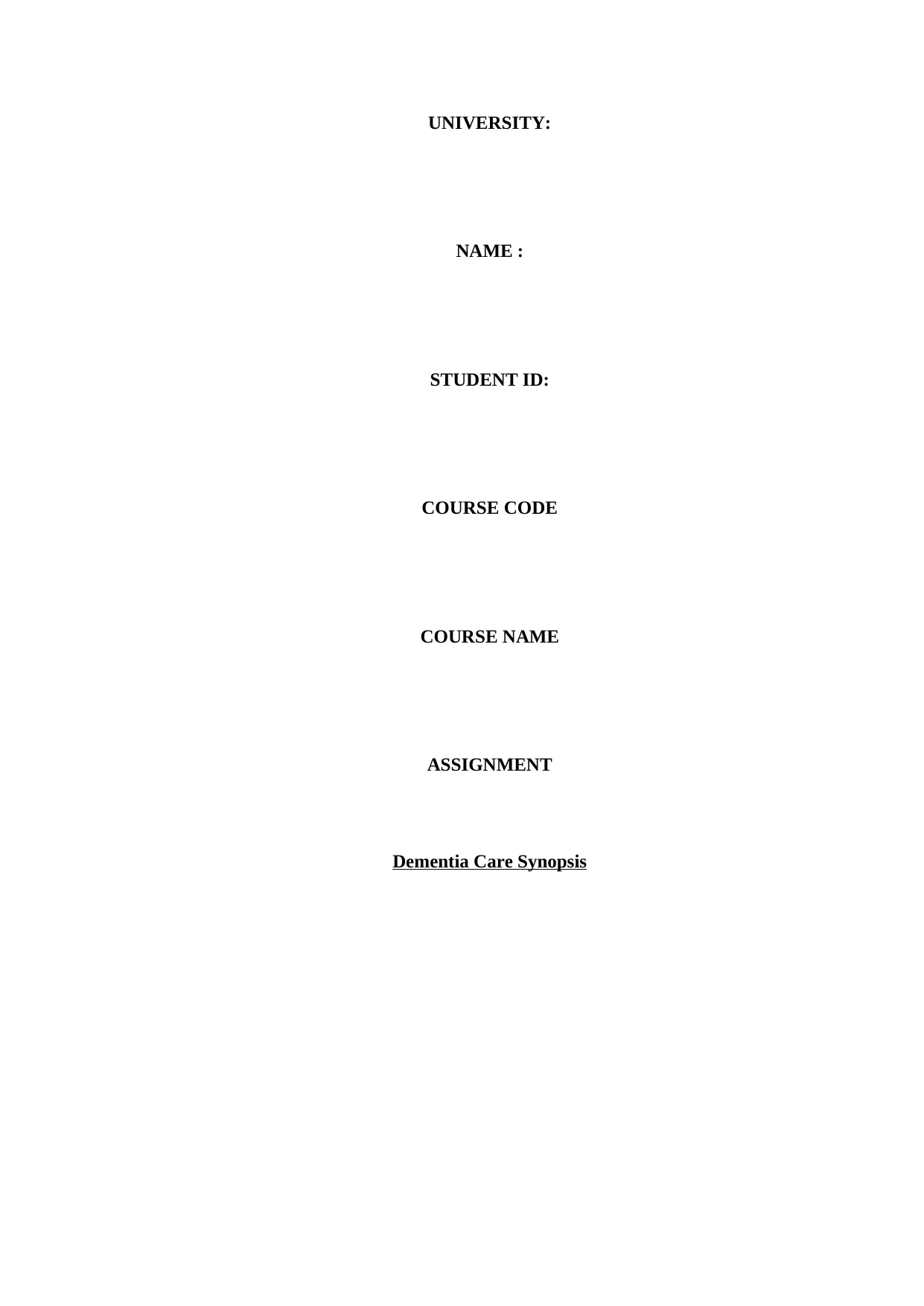
UNIVERSITY:
NAME :
STUDENT ID:
COURSE CODE
COURSE NAME
ASSIGNMENT
Dementia Care Synopsis
NAME :
STUDENT ID:
COURSE CODE
COURSE NAME
ASSIGNMENT
Dementia Care Synopsis
Paraphrase This Document
Need a fresh take? Get an instant paraphrase of this document with our AI Paraphraser
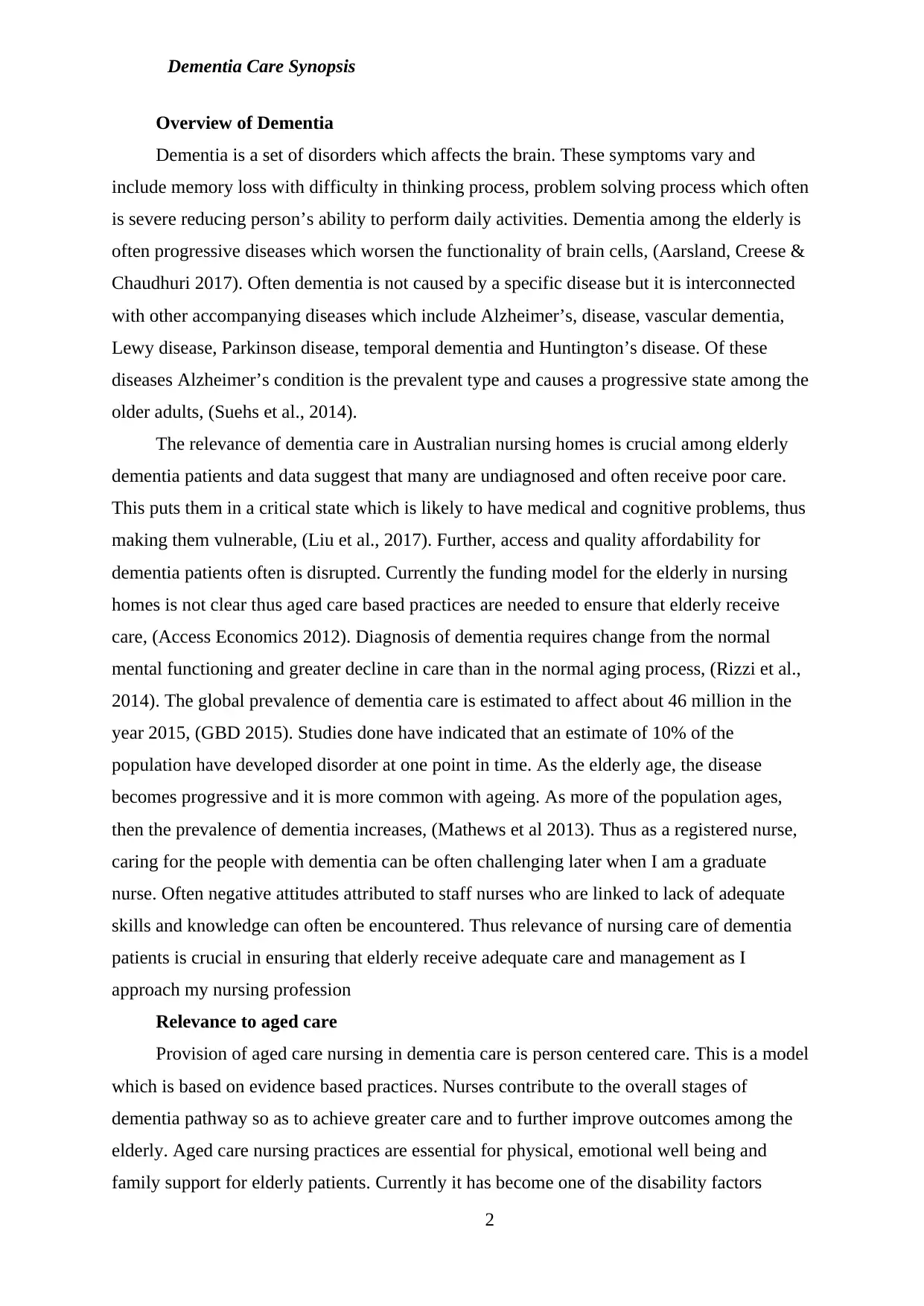
Dementia Care Synopsis
Overview of Dementia
Dementia is a set of disorders which affects the brain. These symptoms vary and
include memory loss with difficulty in thinking process, problem solving process which often
is severe reducing person’s ability to perform daily activities. Dementia among the elderly is
often progressive diseases which worsen the functionality of brain cells, (Aarsland, Creese &
Chaudhuri 2017). Often dementia is not caused by a specific disease but it is interconnected
with other accompanying diseases which include Alzheimer’s, disease, vascular dementia,
Lewy disease, Parkinson disease, temporal dementia and Huntington’s disease. Of these
diseases Alzheimer’s condition is the prevalent type and causes a progressive state among the
older adults, (Suehs et al., 2014).
The relevance of dementia care in Australian nursing homes is crucial among elderly
dementia patients and data suggest that many are undiagnosed and often receive poor care.
This puts them in a critical state which is likely to have medical and cognitive problems, thus
making them vulnerable, (Liu et al., 2017). Further, access and quality affordability for
dementia patients often is disrupted. Currently the funding model for the elderly in nursing
homes is not clear thus aged care based practices are needed to ensure that elderly receive
care, (Access Economics 2012). Diagnosis of dementia requires change from the normal
mental functioning and greater decline in care than in the normal aging process, (Rizzi et al.,
2014). The global prevalence of dementia care is estimated to affect about 46 million in the
year 2015, (GBD 2015). Studies done have indicated that an estimate of 10% of the
population have developed disorder at one point in time. As the elderly age, the disease
becomes progressive and it is more common with ageing. As more of the population ages,
then the prevalence of dementia increases, (Mathews et al 2013). Thus as a registered nurse,
caring for the people with dementia can be often challenging later when I am a graduate
nurse. Often negative attitudes attributed to staff nurses who are linked to lack of adequate
skills and knowledge can often be encountered. Thus relevance of nursing care of dementia
patients is crucial in ensuring that elderly receive adequate care and management as I
approach my nursing profession
Relevance to aged care
Provision of aged care nursing in dementia care is person centered care. This is a model
which is based on evidence based practices. Nurses contribute to the overall stages of
dementia pathway so as to achieve greater care and to further improve outcomes among the
elderly. Aged care nursing practices are essential for physical, emotional well being and
family support for elderly patients. Currently it has become one of the disability factors
2
Overview of Dementia
Dementia is a set of disorders which affects the brain. These symptoms vary and
include memory loss with difficulty in thinking process, problem solving process which often
is severe reducing person’s ability to perform daily activities. Dementia among the elderly is
often progressive diseases which worsen the functionality of brain cells, (Aarsland, Creese &
Chaudhuri 2017). Often dementia is not caused by a specific disease but it is interconnected
with other accompanying diseases which include Alzheimer’s, disease, vascular dementia,
Lewy disease, Parkinson disease, temporal dementia and Huntington’s disease. Of these
diseases Alzheimer’s condition is the prevalent type and causes a progressive state among the
older adults, (Suehs et al., 2014).
The relevance of dementia care in Australian nursing homes is crucial among elderly
dementia patients and data suggest that many are undiagnosed and often receive poor care.
This puts them in a critical state which is likely to have medical and cognitive problems, thus
making them vulnerable, (Liu et al., 2017). Further, access and quality affordability for
dementia patients often is disrupted. Currently the funding model for the elderly in nursing
homes is not clear thus aged care based practices are needed to ensure that elderly receive
care, (Access Economics 2012). Diagnosis of dementia requires change from the normal
mental functioning and greater decline in care than in the normal aging process, (Rizzi et al.,
2014). The global prevalence of dementia care is estimated to affect about 46 million in the
year 2015, (GBD 2015). Studies done have indicated that an estimate of 10% of the
population have developed disorder at one point in time. As the elderly age, the disease
becomes progressive and it is more common with ageing. As more of the population ages,
then the prevalence of dementia increases, (Mathews et al 2013). Thus as a registered nurse,
caring for the people with dementia can be often challenging later when I am a graduate
nurse. Often negative attitudes attributed to staff nurses who are linked to lack of adequate
skills and knowledge can often be encountered. Thus relevance of nursing care of dementia
patients is crucial in ensuring that elderly receive adequate care and management as I
approach my nursing profession
Relevance to aged care
Provision of aged care nursing in dementia care is person centered care. This is a model
which is based on evidence based practices. Nurses contribute to the overall stages of
dementia pathway so as to achieve greater care and to further improve outcomes among the
elderly. Aged care nursing practices are essential for physical, emotional well being and
family support for elderly patients. Currently it has become one of the disability factors
2
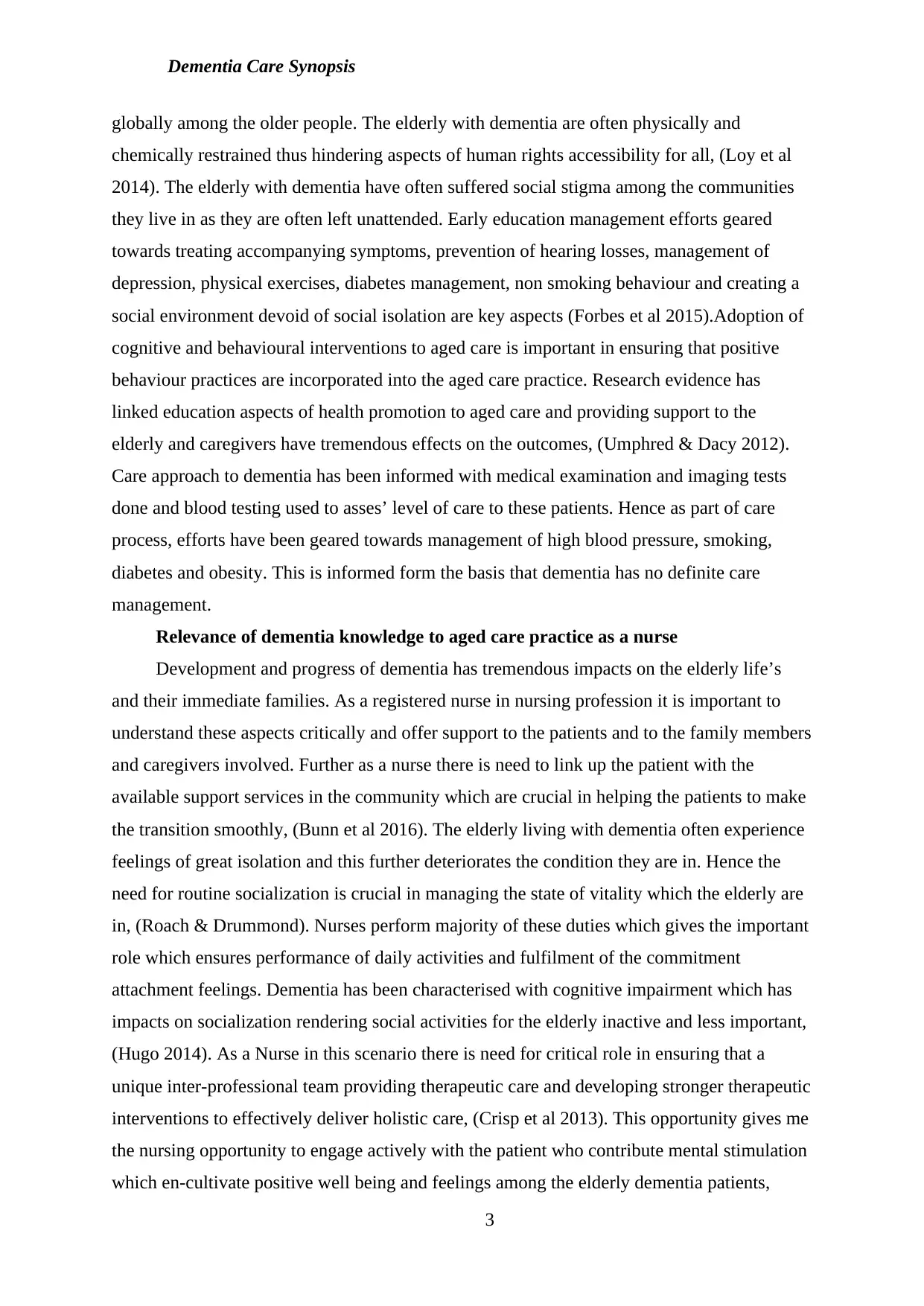
Dementia Care Synopsis
globally among the older people. The elderly with dementia are often physically and
chemically restrained thus hindering aspects of human rights accessibility for all, (Loy et al
2014). The elderly with dementia have often suffered social stigma among the communities
they live in as they are often left unattended. Early education management efforts geared
towards treating accompanying symptoms, prevention of hearing losses, management of
depression, physical exercises, diabetes management, non smoking behaviour and creating a
social environment devoid of social isolation are key aspects (Forbes et al 2015).Adoption of
cognitive and behavioural interventions to aged care is important in ensuring that positive
behaviour practices are incorporated into the aged care practice. Research evidence has
linked education aspects of health promotion to aged care and providing support to the
elderly and caregivers have tremendous effects on the outcomes, (Umphred & Dacy 2012).
Care approach to dementia has been informed with medical examination and imaging tests
done and blood testing used to asses’ level of care to these patients. Hence as part of care
process, efforts have been geared towards management of high blood pressure, smoking,
diabetes and obesity. This is informed form the basis that dementia has no definite care
management.
Relevance of dementia knowledge to aged care practice as a nurse
Development and progress of dementia has tremendous impacts on the elderly life’s
and their immediate families. As a registered nurse in nursing profession it is important to
understand these aspects critically and offer support to the patients and to the family members
and caregivers involved. Further as a nurse there is need to link up the patient with the
available support services in the community which are crucial in helping the patients to make
the transition smoothly, (Bunn et al 2016). The elderly living with dementia often experience
feelings of great isolation and this further deteriorates the condition they are in. Hence the
need for routine socialization is crucial in managing the state of vitality which the elderly are
in, (Roach & Drummond). Nurses perform majority of these duties which gives the important
role which ensures performance of daily activities and fulfilment of the commitment
attachment feelings. Dementia has been characterised with cognitive impairment which has
impacts on socialization rendering social activities for the elderly inactive and less important,
(Hugo 2014). As a Nurse in this scenario there is need for critical role in ensuring that a
unique inter-professional team providing therapeutic care and developing stronger therapeutic
interventions to effectively deliver holistic care, (Crisp et al 2013). This opportunity gives me
the nursing opportunity to engage actively with the patient who contribute mental stimulation
which en-cultivate positive well being and feelings among the elderly dementia patients,
3
globally among the older people. The elderly with dementia are often physically and
chemically restrained thus hindering aspects of human rights accessibility for all, (Loy et al
2014). The elderly with dementia have often suffered social stigma among the communities
they live in as they are often left unattended. Early education management efforts geared
towards treating accompanying symptoms, prevention of hearing losses, management of
depression, physical exercises, diabetes management, non smoking behaviour and creating a
social environment devoid of social isolation are key aspects (Forbes et al 2015).Adoption of
cognitive and behavioural interventions to aged care is important in ensuring that positive
behaviour practices are incorporated into the aged care practice. Research evidence has
linked education aspects of health promotion to aged care and providing support to the
elderly and caregivers have tremendous effects on the outcomes, (Umphred & Dacy 2012).
Care approach to dementia has been informed with medical examination and imaging tests
done and blood testing used to asses’ level of care to these patients. Hence as part of care
process, efforts have been geared towards management of high blood pressure, smoking,
diabetes and obesity. This is informed form the basis that dementia has no definite care
management.
Relevance of dementia knowledge to aged care practice as a nurse
Development and progress of dementia has tremendous impacts on the elderly life’s
and their immediate families. As a registered nurse in nursing profession it is important to
understand these aspects critically and offer support to the patients and to the family members
and caregivers involved. Further as a nurse there is need to link up the patient with the
available support services in the community which are crucial in helping the patients to make
the transition smoothly, (Bunn et al 2016). The elderly living with dementia often experience
feelings of great isolation and this further deteriorates the condition they are in. Hence the
need for routine socialization is crucial in managing the state of vitality which the elderly are
in, (Roach & Drummond). Nurses perform majority of these duties which gives the important
role which ensures performance of daily activities and fulfilment of the commitment
attachment feelings. Dementia has been characterised with cognitive impairment which has
impacts on socialization rendering social activities for the elderly inactive and less important,
(Hugo 2014). As a Nurse in this scenario there is need for critical role in ensuring that a
unique inter-professional team providing therapeutic care and developing stronger therapeutic
interventions to effectively deliver holistic care, (Crisp et al 2013). This opportunity gives me
the nursing opportunity to engage actively with the patient who contribute mental stimulation
which en-cultivate positive well being and feelings among the elderly dementia patients,
3
⊘ This is a preview!⊘
Do you want full access?
Subscribe today to unlock all pages.

Trusted by 1+ million students worldwide
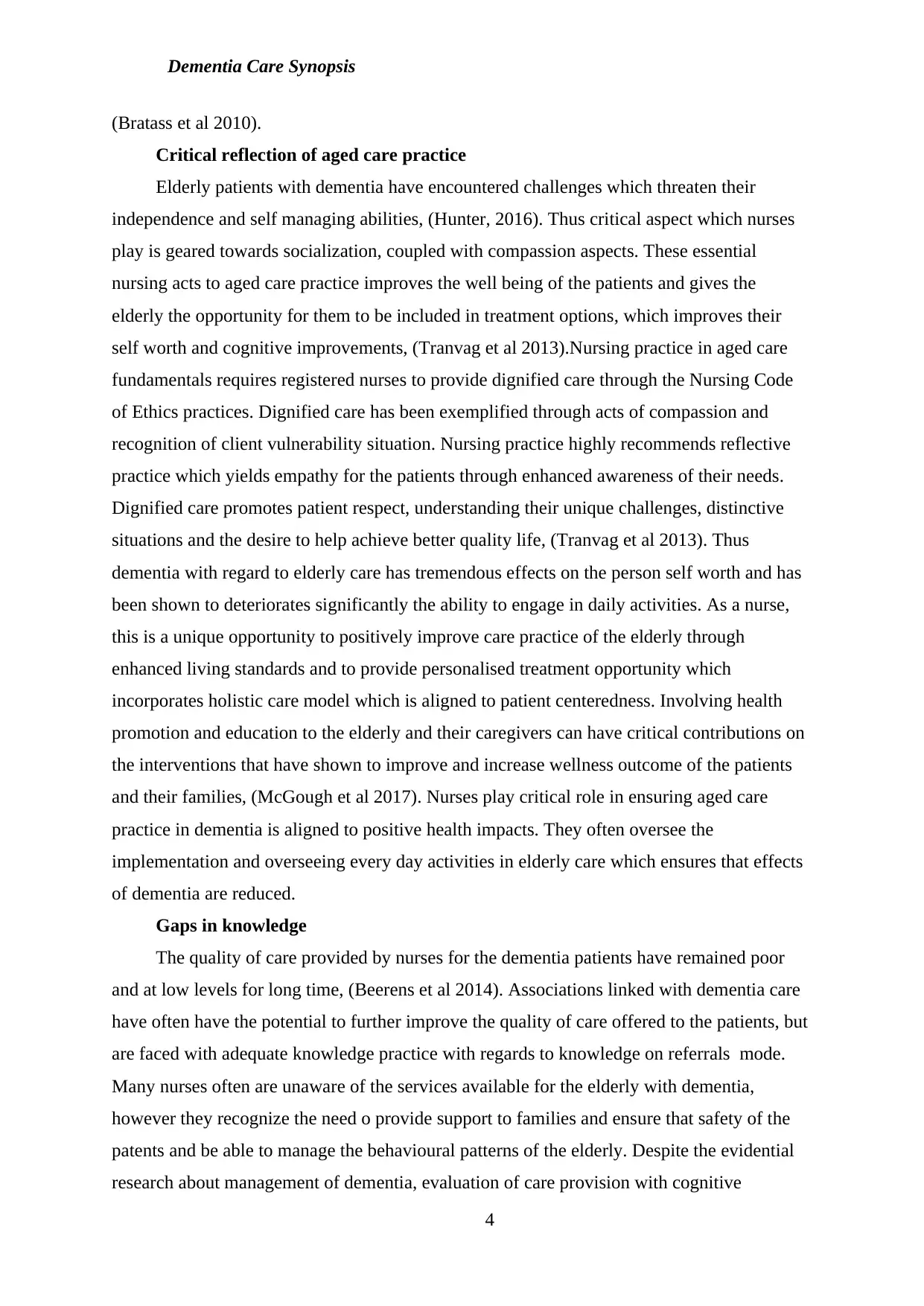
Dementia Care Synopsis
(Bratass et al 2010).
Critical reflection of aged care practice
Elderly patients with dementia have encountered challenges which threaten their
independence and self managing abilities, (Hunter, 2016). Thus critical aspect which nurses
play is geared towards socialization, coupled with compassion aspects. These essential
nursing acts to aged care practice improves the well being of the patients and gives the
elderly the opportunity for them to be included in treatment options, which improves their
self worth and cognitive improvements, (Tranvag et al 2013).Nursing practice in aged care
fundamentals requires registered nurses to provide dignified care through the Nursing Code
of Ethics practices. Dignified care has been exemplified through acts of compassion and
recognition of client vulnerability situation. Nursing practice highly recommends reflective
practice which yields empathy for the patients through enhanced awareness of their needs.
Dignified care promotes patient respect, understanding their unique challenges, distinctive
situations and the desire to help achieve better quality life, (Tranvag et al 2013). Thus
dementia with regard to elderly care has tremendous effects on the person self worth and has
been shown to deteriorates significantly the ability to engage in daily activities. As a nurse,
this is a unique opportunity to positively improve care practice of the elderly through
enhanced living standards and to provide personalised treatment opportunity which
incorporates holistic care model which is aligned to patient centeredness. Involving health
promotion and education to the elderly and their caregivers can have critical contributions on
the interventions that have shown to improve and increase wellness outcome of the patients
and their families, (McGough et al 2017). Nurses play critical role in ensuring aged care
practice in dementia is aligned to positive health impacts. They often oversee the
implementation and overseeing every day activities in elderly care which ensures that effects
of dementia are reduced.
Gaps in knowledge
The quality of care provided by nurses for the dementia patients have remained poor
and at low levels for long time, (Beerens et al 2014). Associations linked with dementia care
have often have the potential to further improve the quality of care offered to the patients, but
are faced with adequate knowledge practice with regards to knowledge on referrals mode.
Many nurses often are unaware of the services available for the elderly with dementia,
however they recognize the need o provide support to families and ensure that safety of the
patents and be able to manage the behavioural patterns of the elderly. Despite the evidential
research about management of dementia, evaluation of care provision with cognitive
4
(Bratass et al 2010).
Critical reflection of aged care practice
Elderly patients with dementia have encountered challenges which threaten their
independence and self managing abilities, (Hunter, 2016). Thus critical aspect which nurses
play is geared towards socialization, coupled with compassion aspects. These essential
nursing acts to aged care practice improves the well being of the patients and gives the
elderly the opportunity for them to be included in treatment options, which improves their
self worth and cognitive improvements, (Tranvag et al 2013).Nursing practice in aged care
fundamentals requires registered nurses to provide dignified care through the Nursing Code
of Ethics practices. Dignified care has been exemplified through acts of compassion and
recognition of client vulnerability situation. Nursing practice highly recommends reflective
practice which yields empathy for the patients through enhanced awareness of their needs.
Dignified care promotes patient respect, understanding their unique challenges, distinctive
situations and the desire to help achieve better quality life, (Tranvag et al 2013). Thus
dementia with regard to elderly care has tremendous effects on the person self worth and has
been shown to deteriorates significantly the ability to engage in daily activities. As a nurse,
this is a unique opportunity to positively improve care practice of the elderly through
enhanced living standards and to provide personalised treatment opportunity which
incorporates holistic care model which is aligned to patient centeredness. Involving health
promotion and education to the elderly and their caregivers can have critical contributions on
the interventions that have shown to improve and increase wellness outcome of the patients
and their families, (McGough et al 2017). Nurses play critical role in ensuring aged care
practice in dementia is aligned to positive health impacts. They often oversee the
implementation and overseeing every day activities in elderly care which ensures that effects
of dementia are reduced.
Gaps in knowledge
The quality of care provided by nurses for the dementia patients have remained poor
and at low levels for long time, (Beerens et al 2014). Associations linked with dementia care
have often have the potential to further improve the quality of care offered to the patients, but
are faced with adequate knowledge practice with regards to knowledge on referrals mode.
Many nurses often are unaware of the services available for the elderly with dementia,
however they recognize the need o provide support to families and ensure that safety of the
patents and be able to manage the behavioural patterns of the elderly. Despite the evidential
research about management of dementia, evaluation of care provision with cognitive
4
Paraphrase This Document
Need a fresh take? Get an instant paraphrase of this document with our AI Paraphraser
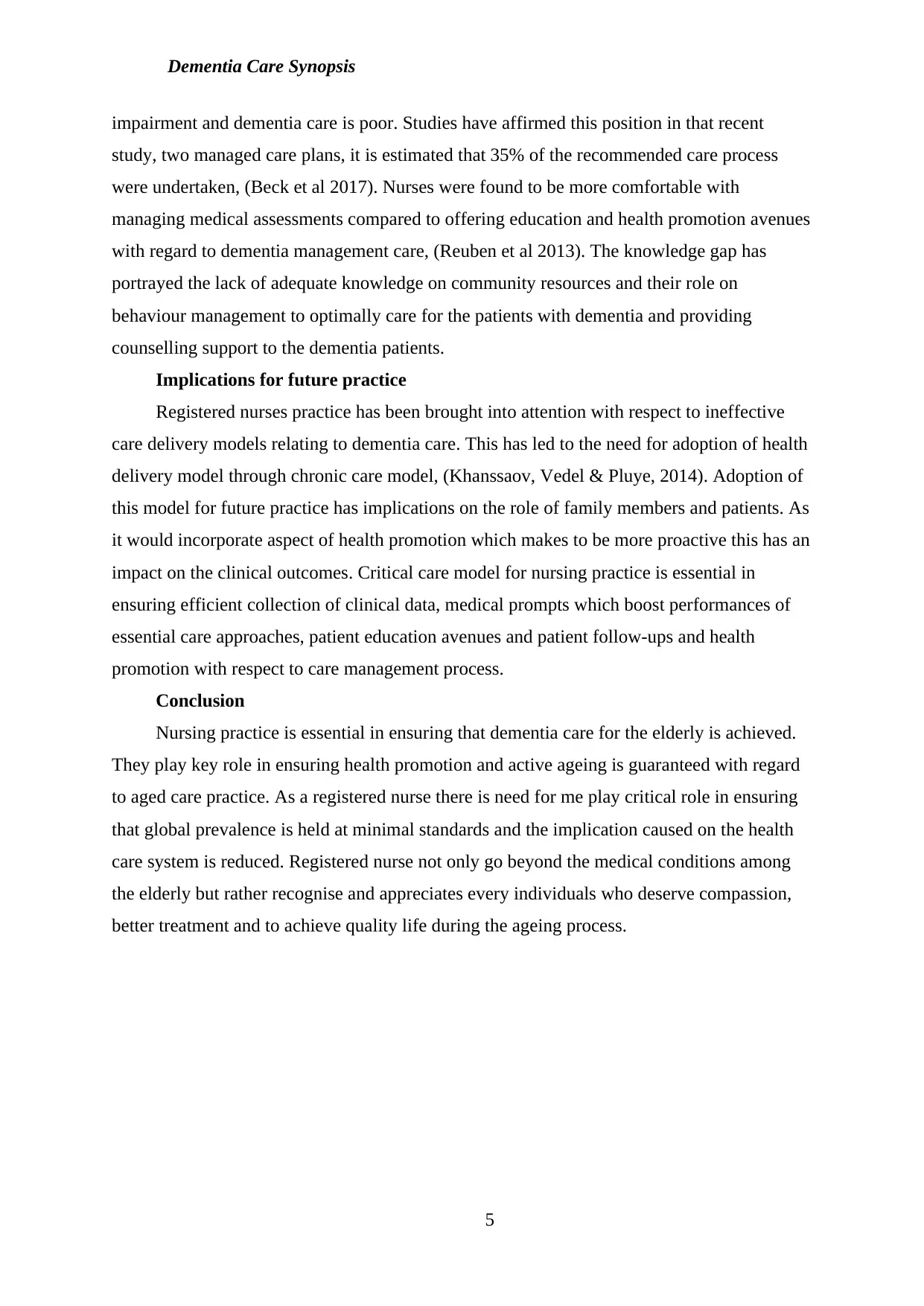
Dementia Care Synopsis
impairment and dementia care is poor. Studies have affirmed this position in that recent
study, two managed care plans, it is estimated that 35% of the recommended care process
were undertaken, (Beck et al 2017). Nurses were found to be more comfortable with
managing medical assessments compared to offering education and health promotion avenues
with regard to dementia management care, (Reuben et al 2013). The knowledge gap has
portrayed the lack of adequate knowledge on community resources and their role on
behaviour management to optimally care for the patients with dementia and providing
counselling support to the dementia patients.
Implications for future practice
Registered nurses practice has been brought into attention with respect to ineffective
care delivery models relating to dementia care. This has led to the need for adoption of health
delivery model through chronic care model, (Khanssaov, Vedel & Pluye, 2014). Adoption of
this model for future practice has implications on the role of family members and patients. As
it would incorporate aspect of health promotion which makes to be more proactive this has an
impact on the clinical outcomes. Critical care model for nursing practice is essential in
ensuring efficient collection of clinical data, medical prompts which boost performances of
essential care approaches, patient education avenues and patient follow-ups and health
promotion with respect to care management process.
Conclusion
Nursing practice is essential in ensuring that dementia care for the elderly is achieved.
They play key role in ensuring health promotion and active ageing is guaranteed with regard
to aged care practice. As a registered nurse there is need for me play critical role in ensuring
that global prevalence is held at minimal standards and the implication caused on the health
care system is reduced. Registered nurse not only go beyond the medical conditions among
the elderly but rather recognise and appreciates every individuals who deserve compassion,
better treatment and to achieve quality life during the ageing process.
5
impairment and dementia care is poor. Studies have affirmed this position in that recent
study, two managed care plans, it is estimated that 35% of the recommended care process
were undertaken, (Beck et al 2017). Nurses were found to be more comfortable with
managing medical assessments compared to offering education and health promotion avenues
with regard to dementia management care, (Reuben et al 2013). The knowledge gap has
portrayed the lack of adequate knowledge on community resources and their role on
behaviour management to optimally care for the patients with dementia and providing
counselling support to the dementia patients.
Implications for future practice
Registered nurses practice has been brought into attention with respect to ineffective
care delivery models relating to dementia care. This has led to the need for adoption of health
delivery model through chronic care model, (Khanssaov, Vedel & Pluye, 2014). Adoption of
this model for future practice has implications on the role of family members and patients. As
it would incorporate aspect of health promotion which makes to be more proactive this has an
impact on the clinical outcomes. Critical care model for nursing practice is essential in
ensuring efficient collection of clinical data, medical prompts which boost performances of
essential care approaches, patient education avenues and patient follow-ups and health
promotion with respect to care management process.
Conclusion
Nursing practice is essential in ensuring that dementia care for the elderly is achieved.
They play key role in ensuring health promotion and active ageing is guaranteed with regard
to aged care practice. As a registered nurse there is need for me play critical role in ensuring
that global prevalence is held at minimal standards and the implication caused on the health
care system is reduced. Registered nurse not only go beyond the medical conditions among
the elderly but rather recognise and appreciates every individuals who deserve compassion,
better treatment and to achieve quality life during the ageing process.
5
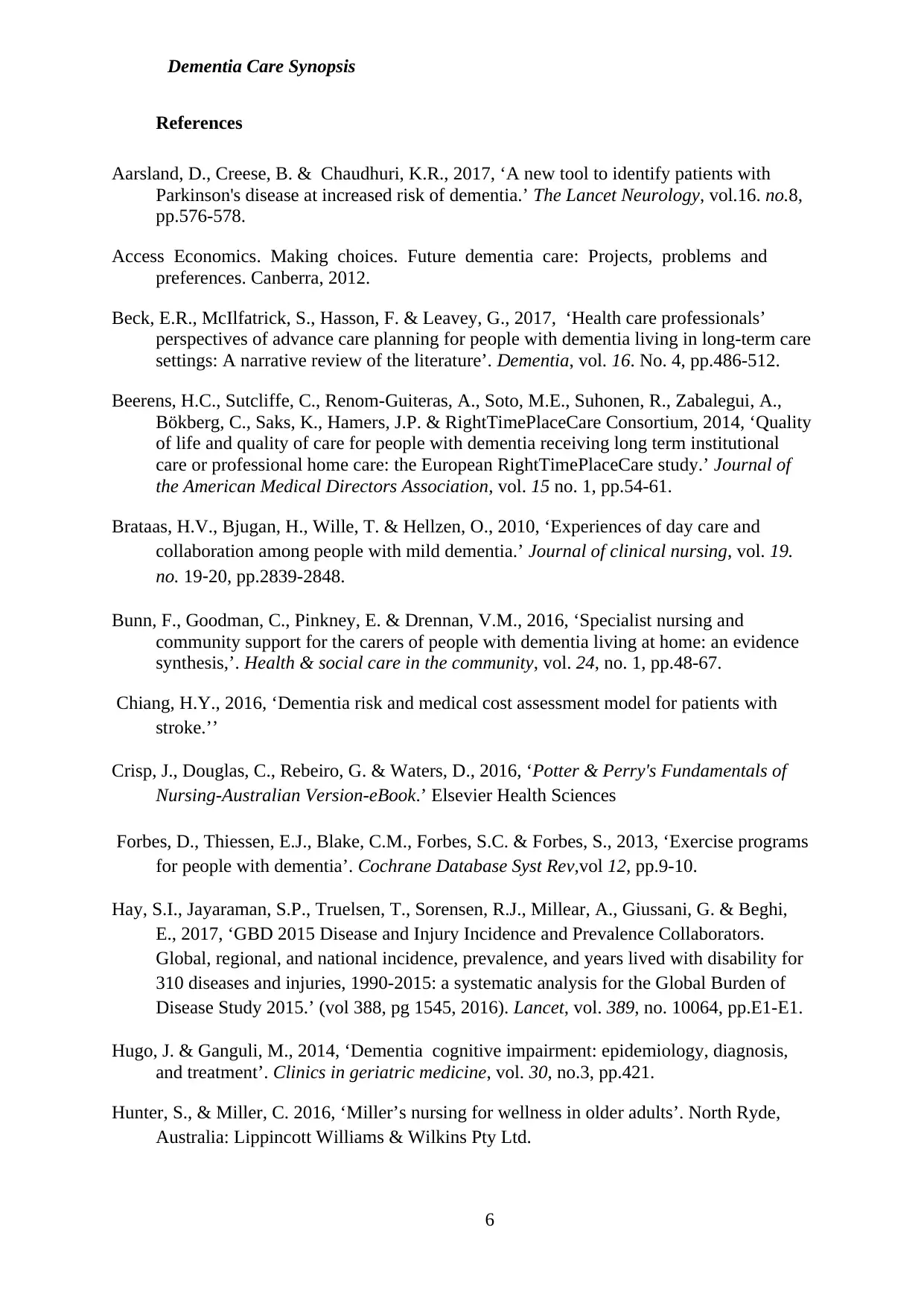
Dementia Care Synopsis
References
Aarsland, D., Creese, B. & Chaudhuri, K.R., 2017, ‘A new tool to identify patients with
Parkinson's disease at increased risk of dementia.’ The Lancet Neurology, vol.16. no.8,
pp.576-578.
Access Economics. Making choices. Future dementia care: Projects, problems and
preferences. Canberra, 2012.
Beck, E.R., McIlfatrick, S., Hasson, F. & Leavey, G., 2017, ‘Health care professionals’
perspectives of advance care planning for people with dementia living in long-term care
settings: A narrative review of the literature’. Dementia, vol. 16. No. 4, pp.486-512.
Beerens, H.C., Sutcliffe, C., Renom-Guiteras, A., Soto, M.E., Suhonen, R., Zabalegui, A.,
Bökberg, C., Saks, K., Hamers, J.P. & RightTimePlaceCare Consortium, 2014, ‘Quality
of life and quality of care for people with dementia receiving long term institutional
care or professional home care: the European RightTimePlaceCare study.’ Journal of
the American Medical Directors Association, vol. 15 no. 1, pp.54-61.
Brataas, H.V., Bjugan, H., Wille, T. & Hellzen, O., 2010, ‘Experiences of day care and
collaboration among people with mild dementia.’ Journal of clinical nursing, vol. 19.
no. 19‐20, pp.2839-2848.
Bunn, F., Goodman, C., Pinkney, E. & Drennan, V.M., 2016, ‘Specialist nursing and
community support for the carers of people with dementia living at home: an evidence
synthesis,’. Health & social care in the community, vol. 24, no. 1, pp.48-67.
Chiang, H.Y., 2016, ‘Dementia risk and medical cost assessment model for patients with
stroke.’’
Crisp, J., Douglas, C., Rebeiro, G. & Waters, D., 2016, ‘Potter & Perry's Fundamentals of
Nursing-Australian Version-eBook.’ Elsevier Health Sciences
Forbes, D., Thiessen, E.J., Blake, C.M., Forbes, S.C. & Forbes, S., 2013, ‘Exercise programs
for people with dementia’. Cochrane Database Syst Rev,vol 12, pp.9-10.
Hay, S.I., Jayaraman, S.P., Truelsen, T., Sorensen, R.J., Millear, A., Giussani, G. & Beghi,
E., 2017, ‘GBD 2015 Disease and Injury Incidence and Prevalence Collaborators.
Global, regional, and national incidence, prevalence, and years lived with disability for
310 diseases and injuries, 1990-2015: a systematic analysis for the Global Burden of
Disease Study 2015.’ (vol 388, pg 1545, 2016). Lancet, vol. 389, no. 10064, pp.E1-E1.
Hugo, J. & Ganguli, M., 2014, ‘Dementia cognitive impairment: epidemiology, diagnosis,
and treatment’. Clinics in geriatric medicine, vol. 30, no.3, pp.421.
Hunter, S., & Miller, C. 2016, ‘Miller’s nursing for wellness in older adults’. North Ryde,
Australia: Lippincott Williams & Wilkins Pty Ltd.
6
References
Aarsland, D., Creese, B. & Chaudhuri, K.R., 2017, ‘A new tool to identify patients with
Parkinson's disease at increased risk of dementia.’ The Lancet Neurology, vol.16. no.8,
pp.576-578.
Access Economics. Making choices. Future dementia care: Projects, problems and
preferences. Canberra, 2012.
Beck, E.R., McIlfatrick, S., Hasson, F. & Leavey, G., 2017, ‘Health care professionals’
perspectives of advance care planning for people with dementia living in long-term care
settings: A narrative review of the literature’. Dementia, vol. 16. No. 4, pp.486-512.
Beerens, H.C., Sutcliffe, C., Renom-Guiteras, A., Soto, M.E., Suhonen, R., Zabalegui, A.,
Bökberg, C., Saks, K., Hamers, J.P. & RightTimePlaceCare Consortium, 2014, ‘Quality
of life and quality of care for people with dementia receiving long term institutional
care or professional home care: the European RightTimePlaceCare study.’ Journal of
the American Medical Directors Association, vol. 15 no. 1, pp.54-61.
Brataas, H.V., Bjugan, H., Wille, T. & Hellzen, O., 2010, ‘Experiences of day care and
collaboration among people with mild dementia.’ Journal of clinical nursing, vol. 19.
no. 19‐20, pp.2839-2848.
Bunn, F., Goodman, C., Pinkney, E. & Drennan, V.M., 2016, ‘Specialist nursing and
community support for the carers of people with dementia living at home: an evidence
synthesis,’. Health & social care in the community, vol. 24, no. 1, pp.48-67.
Chiang, H.Y., 2016, ‘Dementia risk and medical cost assessment model for patients with
stroke.’’
Crisp, J., Douglas, C., Rebeiro, G. & Waters, D., 2016, ‘Potter & Perry's Fundamentals of
Nursing-Australian Version-eBook.’ Elsevier Health Sciences
Forbes, D., Thiessen, E.J., Blake, C.M., Forbes, S.C. & Forbes, S., 2013, ‘Exercise programs
for people with dementia’. Cochrane Database Syst Rev,vol 12, pp.9-10.
Hay, S.I., Jayaraman, S.P., Truelsen, T., Sorensen, R.J., Millear, A., Giussani, G. & Beghi,
E., 2017, ‘GBD 2015 Disease and Injury Incidence and Prevalence Collaborators.
Global, regional, and national incidence, prevalence, and years lived with disability for
310 diseases and injuries, 1990-2015: a systematic analysis for the Global Burden of
Disease Study 2015.’ (vol 388, pg 1545, 2016). Lancet, vol. 389, no. 10064, pp.E1-E1.
Hugo, J. & Ganguli, M., 2014, ‘Dementia cognitive impairment: epidemiology, diagnosis,
and treatment’. Clinics in geriatric medicine, vol. 30, no.3, pp.421.
Hunter, S., & Miller, C. 2016, ‘Miller’s nursing for wellness in older adults’. North Ryde,
Australia: Lippincott Williams & Wilkins Pty Ltd.
6
⊘ This is a preview!⊘
Do you want full access?
Subscribe today to unlock all pages.

Trusted by 1+ million students worldwide
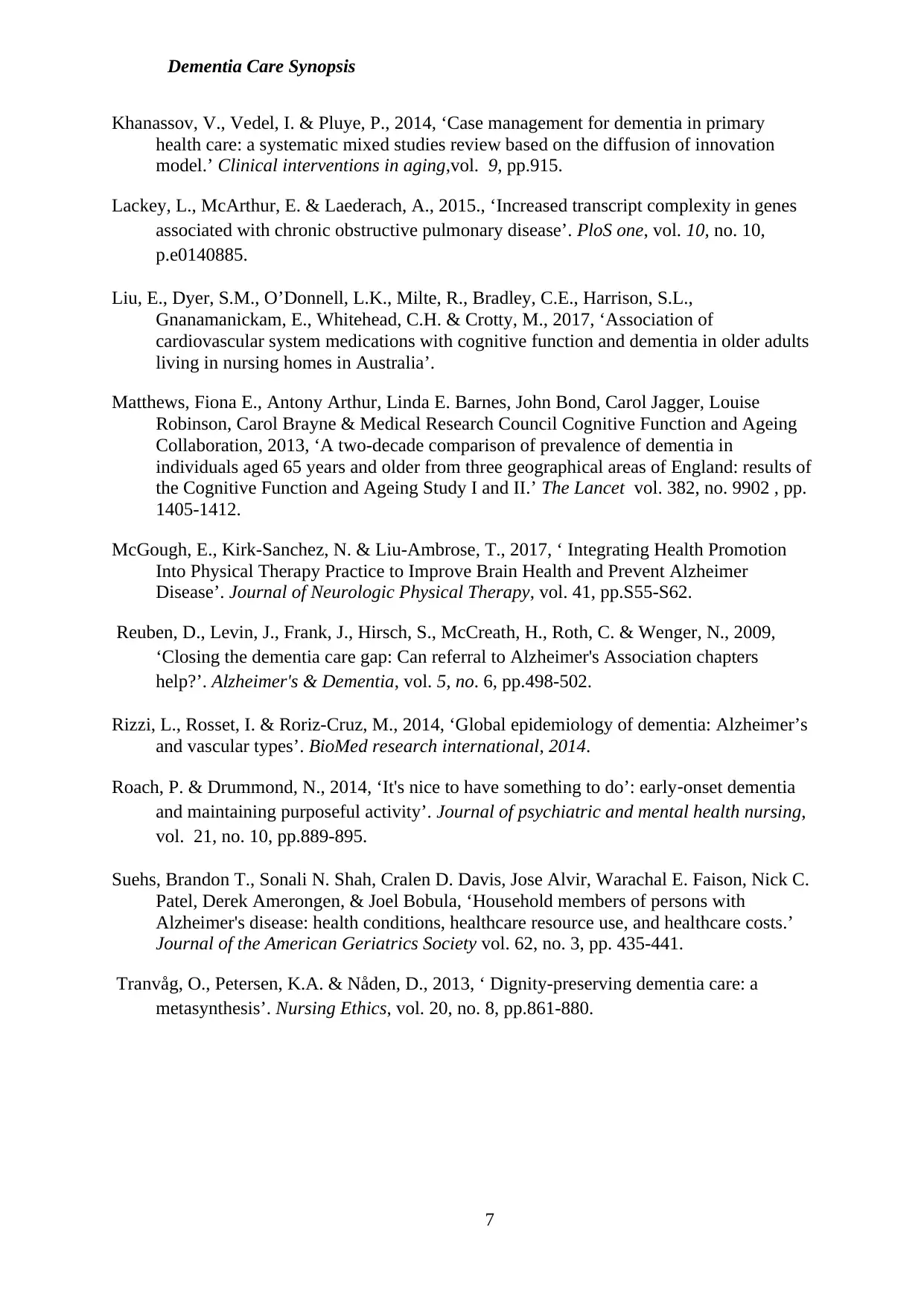
Dementia Care Synopsis
Khanassov, V., Vedel, I. & Pluye, P., 2014, ‘Case management for dementia in primary
health care: a systematic mixed studies review based on the diffusion of innovation
model.’ Clinical interventions in aging,vol. 9, pp.915.
Lackey, L., McArthur, E. & Laederach, A., 2015., ‘Increased transcript complexity in genes
associated with chronic obstructive pulmonary disease’. PloS one, vol. 10, no. 10,
p.e0140885.
Liu, E., Dyer, S.M., O’Donnell, L.K., Milte, R., Bradley, C.E., Harrison, S.L.,
Gnanamanickam, E., Whitehead, C.H. & Crotty, M., 2017, ‘Association of
cardiovascular system medications with cognitive function and dementia in older adults
living in nursing homes in Australia’.
Matthews, Fiona E., Antony Arthur, Linda E. Barnes, John Bond, Carol Jagger, Louise
Robinson, Carol Brayne & Medical Research Council Cognitive Function and Ageing
Collaboration, 2013, ‘A two-decade comparison of prevalence of dementia in
individuals aged 65 years and older from three geographical areas of England: results of
the Cognitive Function and Ageing Study I and II.’ The Lancet vol. 382, no. 9902 , pp.
1405-1412.
McGough, E., Kirk-Sanchez, N. & Liu-Ambrose, T., 2017, ‘ Integrating Health Promotion
Into Physical Therapy Practice to Improve Brain Health and Prevent Alzheimer
Disease’. Journal of Neurologic Physical Therapy, vol. 41, pp.S55-S62.
Reuben, D., Levin, J., Frank, J., Hirsch, S., McCreath, H., Roth, C. & Wenger, N., 2009,
‘Closing the dementia care gap: Can referral to Alzheimer's Association chapters
help?’. Alzheimer's & Dementia, vol. 5, no. 6, pp.498-502.
Rizzi, L., Rosset, I. & Roriz-Cruz, M., 2014, ‘Global epidemiology of dementia: Alzheimer’s
and vascular types’. BioMed research international, 2014.
Roach, P. & Drummond, N., 2014, ‘It's nice to have something to do’: early‐onset dementia
and maintaining purposeful activity’. Journal of psychiatric and mental health nursing,
vol. 21, no. 10, pp.889-895.
Suehs, Brandon T., Sonali N. Shah, Cralen D. Davis, Jose Alvir, Warachal E. Faison, Nick C.
Patel, Derek Amerongen, & Joel Bobula, ‘Household members of persons with
Alzheimer's disease: health conditions, healthcare resource use, and healthcare costs.’
Journal of the American Geriatrics Society vol. 62, no. 3, pp. 435-441.
Tranvåg, O., Petersen, K.A. & Nåden, D., 2013, ‘ Dignity-preserving dementia care: a
metasynthesis’. Nursing Ethics, vol. 20, no. 8, pp.861-880.
7
Khanassov, V., Vedel, I. & Pluye, P., 2014, ‘Case management for dementia in primary
health care: a systematic mixed studies review based on the diffusion of innovation
model.’ Clinical interventions in aging,vol. 9, pp.915.
Lackey, L., McArthur, E. & Laederach, A., 2015., ‘Increased transcript complexity in genes
associated with chronic obstructive pulmonary disease’. PloS one, vol. 10, no. 10,
p.e0140885.
Liu, E., Dyer, S.M., O’Donnell, L.K., Milte, R., Bradley, C.E., Harrison, S.L.,
Gnanamanickam, E., Whitehead, C.H. & Crotty, M., 2017, ‘Association of
cardiovascular system medications with cognitive function and dementia in older adults
living in nursing homes in Australia’.
Matthews, Fiona E., Antony Arthur, Linda E. Barnes, John Bond, Carol Jagger, Louise
Robinson, Carol Brayne & Medical Research Council Cognitive Function and Ageing
Collaboration, 2013, ‘A two-decade comparison of prevalence of dementia in
individuals aged 65 years and older from three geographical areas of England: results of
the Cognitive Function and Ageing Study I and II.’ The Lancet vol. 382, no. 9902 , pp.
1405-1412.
McGough, E., Kirk-Sanchez, N. & Liu-Ambrose, T., 2017, ‘ Integrating Health Promotion
Into Physical Therapy Practice to Improve Brain Health and Prevent Alzheimer
Disease’. Journal of Neurologic Physical Therapy, vol. 41, pp.S55-S62.
Reuben, D., Levin, J., Frank, J., Hirsch, S., McCreath, H., Roth, C. & Wenger, N., 2009,
‘Closing the dementia care gap: Can referral to Alzheimer's Association chapters
help?’. Alzheimer's & Dementia, vol. 5, no. 6, pp.498-502.
Rizzi, L., Rosset, I. & Roriz-Cruz, M., 2014, ‘Global epidemiology of dementia: Alzheimer’s
and vascular types’. BioMed research international, 2014.
Roach, P. & Drummond, N., 2014, ‘It's nice to have something to do’: early‐onset dementia
and maintaining purposeful activity’. Journal of psychiatric and mental health nursing,
vol. 21, no. 10, pp.889-895.
Suehs, Brandon T., Sonali N. Shah, Cralen D. Davis, Jose Alvir, Warachal E. Faison, Nick C.
Patel, Derek Amerongen, & Joel Bobula, ‘Household members of persons with
Alzheimer's disease: health conditions, healthcare resource use, and healthcare costs.’
Journal of the American Geriatrics Society vol. 62, no. 3, pp. 435-441.
Tranvåg, O., Petersen, K.A. & Nåden, D., 2013, ‘ Dignity-preserving dementia care: a
metasynthesis’. Nursing Ethics, vol. 20, no. 8, pp.861-880.
7
1 out of 7
Related Documents
Your All-in-One AI-Powered Toolkit for Academic Success.
+13062052269
info@desklib.com
Available 24*7 on WhatsApp / Email
![[object Object]](/_next/static/media/star-bottom.7253800d.svg)
Unlock your academic potential
Copyright © 2020–2026 A2Z Services. All Rights Reserved. Developed and managed by ZUCOL.





